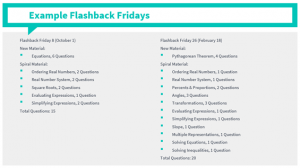What if you were told that a weekly spiraled assessment was a vital part of preparing your students for the end-of-year summative assessment? When we, an eighth-grade math co-teaching team, started working together in 2017, we were not convinced. Now, six years later, we not only believe in weekly spiraled assessments (WSAs) and use them in our classes, but we also preach their benefits to colleagues. It’s one of three assessment strategies that we believe build student mastery, confidence, and test-taking skills:
- WSAs,
- Diminishing scaffolded assessment supports, and
- Data-based decision making.
The most significant benefit of WSAs is that they lessen the need for weeks of intensive review before high-stakes testing. WSAs allow teachers to plan so that pre-skills are screened and addressed before teaching new skills.
It’s a similar approach to how athletes train. Elite swimmers do not “cram” right before a big swim meet, they rest their bodies, calm their emotions, and lighten their training load. But before that, they learn the technique of swim strokes, starts, and turns. Applying that process to math, short, standards-focused WSAs, are the measuring point that we use to gauge student mastery by providing a 12-20 question “snapshot” of their skills each week. We are often asked how we expect our students to succeed on a 50-60 question summative assessment if they have no test-taking stamina. We stand firm in the belief, and have data supporting it, that students will work through an assessment, of any length, if they have mastered the required skills, have confidence in their abilities, and have a desire to succeed.
| 2016-2017 7th Grade SOL Pass Rates | 2017-2018 8th Grade SOL Pass Rates | 2017-2018 7th Grade SOL Pass Rates | 2018-2019 8th Grade SOL Pass Rates | 2018-2019 7th Grade SOL Pass Rates | 2019-2020 8th Grade SOL Pass Rates |
| 42% | 96% | 48% | 100% | 46% | Cancelled |
| 62% | 96% | 42% | 89% | 46% | |
| 58% | 96% | 47% | 100% | 54% | |
| State Pass Rate: | 71% | 77% | |||
| Division Pass Rate: | 80% | 82% |
| 2019-2020 7th Grade SOL Pass Rates | 2020-2021 8th Grade SOL Pass Rates | 2020-2021 SPED SOL Pass Rates | 2020-2021 7th Grade SOL Pass Rates | 2021-2022 8th Grade SOL Pass Rates | 2021-2022 SPED SOL Pass Rates |
| Cancelled | 77% | 67% | 14% | 91% | 88% |
| 81% | 80% | 15% | 96% | 92% | |
| 65% | 67% | 17% | 93% | 85% | |
| State Pass Rate: | 43% | 57% | |||
| Division Pass Rate: | 60% | 74% |
Diminishing scaffolded assessment supports during WSAs are used to teach test-taking skills that benefit students across all subject areas. The scaffolded supports have no predetermined period for use but were created to be fluid and diminish as students progress through the curriculum. An example of how the BensonVoss team uses assessment support follows. We use the supports in the order presented, one at a time:
- Students are encouraged to use their math notes while taking their WSA. This teaches students the importance of participating during each lesson and encourages “visualizing” notes for recall.
Time Used: 4-6 Weeks
- Students are encouraged to have their answers checked by a teacher who then “flags” those that are incorrect. To earn the privilege of changing an incorrect answer, students must show their method for solving the problem correctly. Data is kept, recording performance on each attempt. This teaches students to carefully read, review, and complete each question before moving on to the next. When students go back and correct responses, it teaches them the importance of double-checking their work before turning in an assignment.
Time Used: 4-6 Weeks
- Students are encouraged to choose five questions to be checked by a teacher. They may change their answer(s) using the same process as above. This puts more responsibility on the student as they may only choose five questions to have checked, rather than all of them. Students begin to internalize the need for careful consideration, problem-solving, technology usage, and answer choices.
Time Used: 6 Weeks
- Students may review the WSA before beginning and may ask for clarification of vocabulary, or may offer us a similar problem, that we may solve as an example for the class. This continues to give the students the responsibility of carefully considering each question.
Time Used: 6 Weeks
- Students take their WSAs, without supports, in a “forward only” format. More specifically, once a student answers a question and goes to the next one, they are not able to go back to previous questions. This mimics the format of our state summative assessment. This prepares students for what they will face during formative assessments.
Time Used: 6 Weeks
Utilizing the WSA data to inform instructional decision making is vital to the success of our assessment system. We use data from the previous week to choose the skills that will be spiraled into the WSA and focus activities for the following week. Students who score less than 70% on their WSA are encouraged to stay after school, during directed study (study hall), or attend virtual meetings to review what they missed and for more instruction on skills that have not been mastered.
Below you will see how our Flashback Fridays are created at different points in the school year. As you will notice, we assessed equations heavily on an October WSA, but we were still assessing them on a February WSA.

WSAs, diminishing scaffolded assessment supports, and data-based decision-making are what we rely on to build student mastery, confidence, and test-taking skills. How can you possibly prepare high-needs students for a 50-60 question summative assessment using only 12-20 questions per week? Our answer is simple and proven: stamina for high-stakes testing is gained by mastery rather than endurance training.
Our students’ pass rates have improved year after year. The continual review of mastered skills throughout the school year is akin to the elite swimmer that continually carves out time to practice the techniques that got them to the championship meet in the first place. We may not have met WSAs with open arms, in the beginning, but now we are their biggest fans.
Amber Benson and Ruby Voss, AKA BensonVoss, are an 8th grade math co-teaching team at Northside Middle School in Roanoke, VA. They are the 2022 recipients of the AMLE Middle School Educator of the Year Award, and will present and be recognized this November at #AMLE22: The 49th Annual Conference for Middle Level Education.
